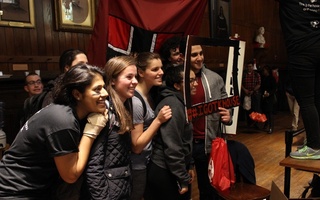Freshmen, congratulations on making it out of the Blocking Games alive.
For some, logging onto the Residential Portal yesterday was a mere formality for something you’ve had since before Thanksgiving. For others, it might have been a battle with the self, bloody with tensions between your friends and yourself.
Right around this time of year, our campus is abuzz with conversations about something a bit different from the usual. A sociological study of blocking could produce journals full of academic hits on more complex themes such as race, socioeconomics, and much more. But the quick and dirty summary of our conversations at this time of the year is that they are actually about some of the most basic questions of living: Who will we live with, and where?
This is not to disregard that we are still taking the prospect of having a roof over our heads for granted. But it’s not everyday that we are so worried and so insecure about our choices behind a fundamental human need. Isn’t Harvard supposed to be the padding that makes us numb to worrying about “life things” like tidying our bathroom or preparing our dinner, so that we can aspire to bigger and better things?
Harvard students are liberal at the head but not the heart. As we fly to China to teach kids at the end of the summer and organize conferences on social innovation, we are innovators and problem solvers for the public good. The beneficiaries of our empathy are often as far away as the protesters in Hong Kong but never closer than the kids in Somerville.
There is no doubt that this is all good work. When we pride ourselves on alumni that have changed the world, this is what we’re talking about. But do we do this at the expense of empathy due to those directly around us?
I can count on one hand the number of times that I’ve set aside a slot on my Google Calendar to attend my blockmate’s things. On the other, I can count the number of sentences that I exchange with my roommate when I come back to the room after a long day, on nights that we don’t eat together. Although I can’t tell you for sure, maybe I can make an educated guess at my roommates’ mental and psychological well-beings?
This has been said time and time again, only to have all the Facebook likes fall to complete silence after a couple of days. I’ve said it too, although I am clearly guilty of the accusations myself.
This is why all the vulnerability and buzz surrounding blocking sometimes excites me. At least for a couple of weeks, it brings our attention from far, far away back down to the local sphere.
This shows me that we are capable of having both the mental bandwidth and the emotional quotient to build good neighborhoods on campus. I love my community in Winthrop—a special shout-out to our amazing junior class is mandatory here—but in a campus so full of loneliness and anxieties both light and dark, we could be doing so much more for each other.
This starts with making efforts to build emotional and mental homes for each other, starting with your blockmates or roommates but hopefully for your house at large too. A lot of it comes down to investment of time at the end of the day, but it’s also dependent on the disposition that informs your daily actions. Offer some tea to the rest of your suitemates while making some for yourself in the common room. Strike up a conversation in the servery. Ask the grill staff about their kids.
The beauty of blocking or rooming groups, among their many inconveniences, is that it allows for structure in which we can start performing a lot of these actions.
I’ve sucked at all of this too, but I’ve been trying to remind myself again and again: We’re all works in progress.
See you on Housing Day. I hope you’re all good neighbors.
Jenny J. Choi ’16, is a social studies concentrator in Winthrop House. Her column appears on alternate Thursdays.
Read more in Opinion
He, She, and InclusivityRecommended Articles
-
Go Bronze, Young WomanIn my last column I commented on some of the frustration I experience when trying to shop for make-up products
-
Life at the FAS PromptBefore my senior year in high school, my family didn’t have a computer—when I needed to type papers I would
-
Have You Seen This Man? (Are You Sure?)“I am an invisible man. No, I am not a spook like those who haunted Edgar Allan Poe; nor am
-
Block to the TopWhen freshmen select their blocking group or choose to block alone, they are not selecting their social circle for the next three years.
-
 How to Finesse Your Way Into a Blocking Group
How to Finesse Your Way Into a Blocking Group













